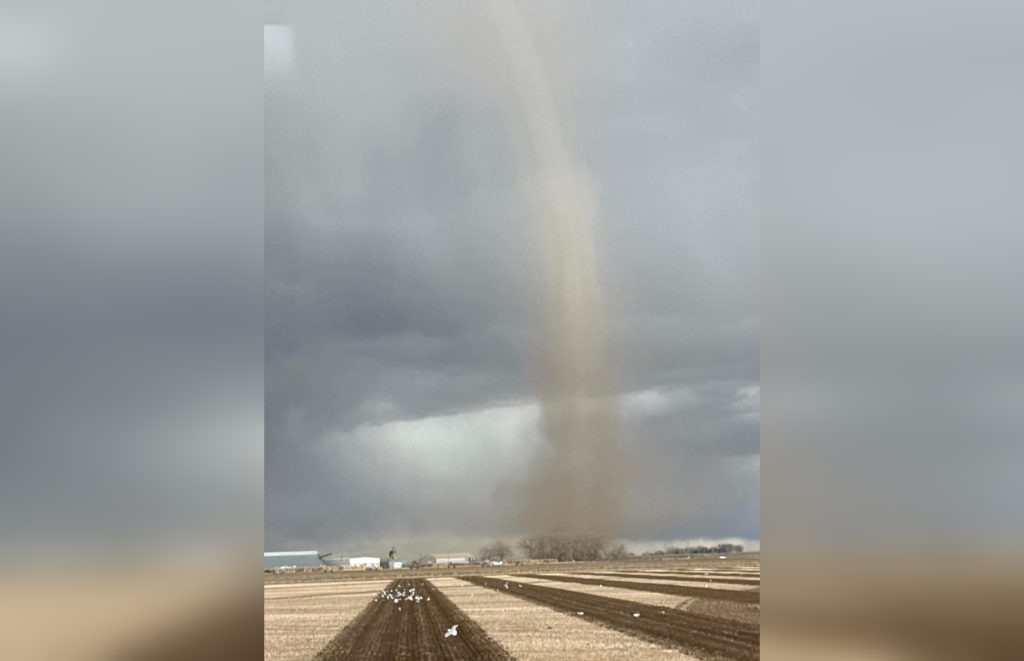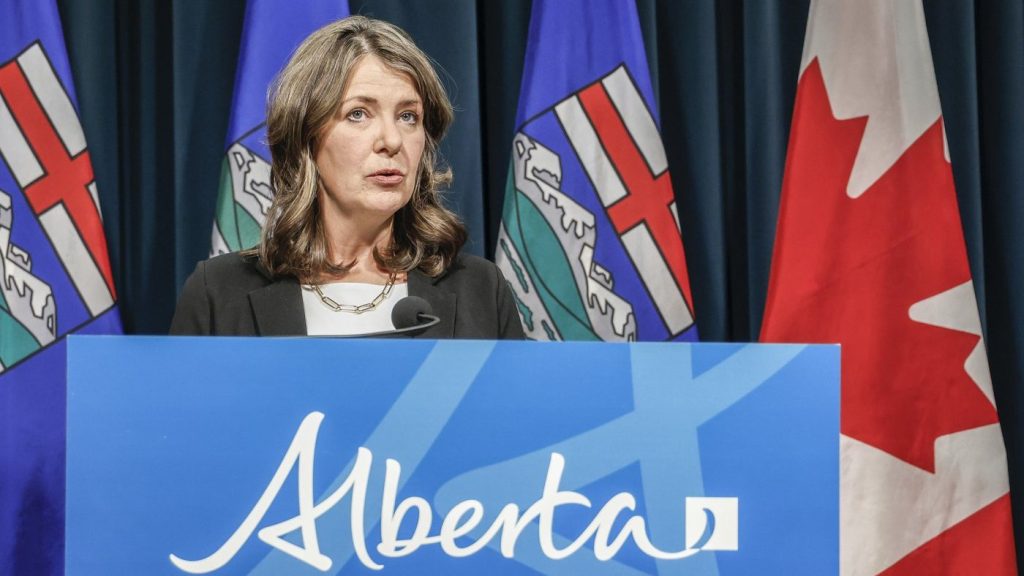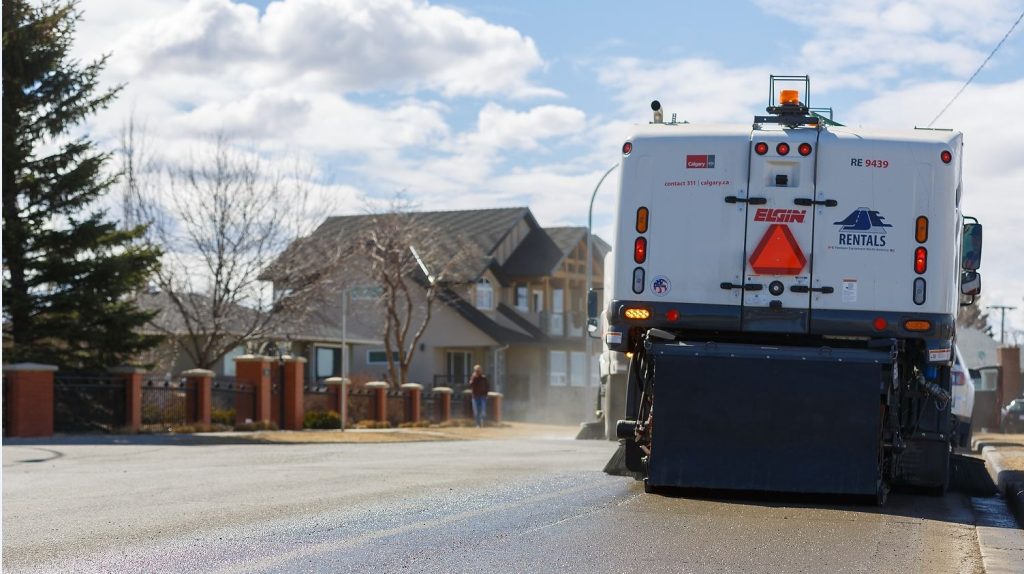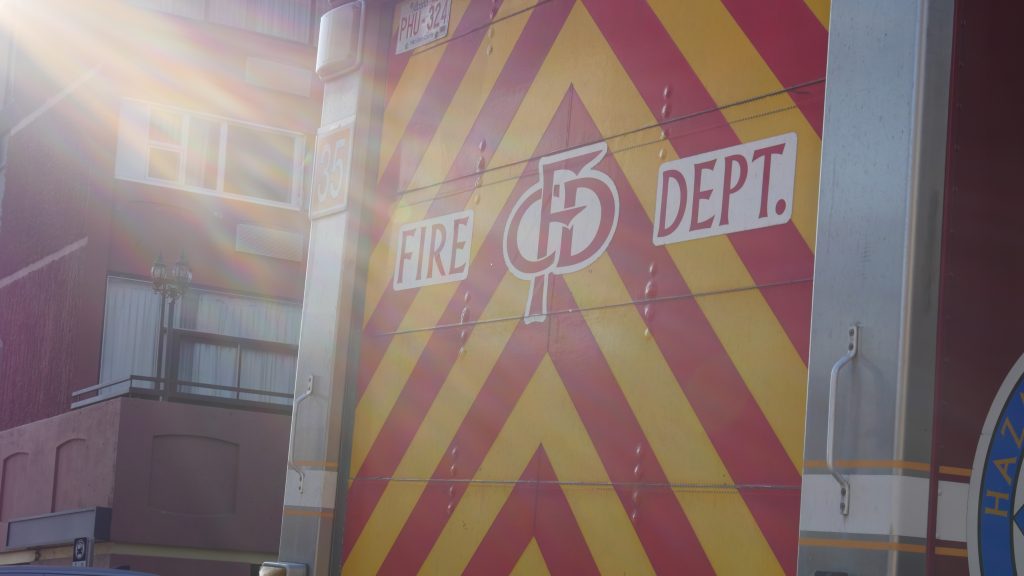Calgary budget: property taxes up an average of 3.7% over four years

Posted Nov 8, 2022 8:16 pm.
The city has released its proposed four-year budget, and if councillors stay true to the initial numbers, homeowners are going to be on the hook for an average annual increase of nearly 4 per cent over the four-year cycle.
In the city’s 2023-2026 Service Plans and Budgets that was proposed to council Tuesday, the total annual operating budget is expected to increase to $4.9 billion by 2026 from $4.6 billion.
Calgary Mayor Jyoti Gondek said she was impressed after the city’s administration went back to the drawing board over the summer.
“We’ve heard from our general managers, we’ve heard from our CFO that they feel Calgarians can continue to expect a strong level of service with a lot of respect for the fact that we’re just coming out of recession,” Gondek said.
However, the total amount of tax collected from existing properties is going to increase by an annual 3.7 per cent increase. Calgary homeowners could see a property tax hike of 5.2 per cent in 2023.
“We did our best together with the administration to make sure that the increase you are facing is based on inflation and population growth, just like inflation is impacting all of the other things in our lives,” Gondek said.
“The other thing that I would ask people to remember and focus on is the assessed value of your property, you can compare what it was last year to what it is this year. And then you can understand better why your property tax might go up.”
Gondek says the business community asked for something lower to remain competitive, which forced the city to “balance the interest of the business community.”
“If we left things the way they are right now, … it looks like the non-residential folks are paying about 4.13 times more than residential folks. That’s how the proportion and the ratio has worked out,” Gondek said.
“We’re going to have to think about what that means in terms of investment and economic growth. And we’re going to have to think about what it means to residential homeowners. This is not a quick fix.”
Roughly 65 per cent of the property taxes are intended for city services, while 34 per cent will go to the province.
Budget included information from Fall Survey of Calgarians
The 2023-2026 Service Plans and Budgets was helped by Calgarians and their input in surveys and engagement made throughout the year, which includes the most recent Fall Survey of Calgarians.
It highlighted traffic and roads, crime, safety and policing, and transit. Additionally, the top priorities for additional investment included affordable housing for low-income Calgarians and public transit.
Police services are projected to see a $34.8 million increase in funding, which will bring more staff and technology to the city’s police force.
While some councillors have hoped for a future property tax freeze, Ward 1 Coun. Sonya Sharp says that reality is hard to predict.
“I can’t speak for what years are to come, but I can say right now that would be really hard to move forward with on a zero per cent freeze for what even Calgarians are asking for just around public health and safety,” Sharp said.
“Calgarians are asking for things that will cost money. And that is affordable living and fixing crime in the city.”
The city says 87 per cent of Calgarians said they felt safe. However, in 2022, according to the Fall Survey of Calgarians, 77 per cent of residents report feeling safe.
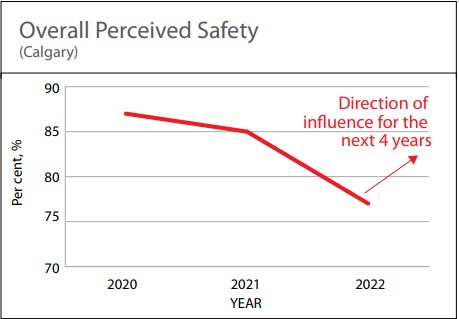
Screenshot from the Fall Survey of Calgarians (previously “Calgary Citizen Satisfaction
Survey”) (Courtesy of the City of Calgary)
They also add that roughly 68 per cent of Calgarians report a sense of belonging in their community.
The city says household expenditures will increase by 7.2 per cent this year, and add that they tried to “keep expenditures as low as possible” to maintain affordability.
For the city’s operational budget, over $500 million is being budgeted for transit improvements, and $276 million is being saved for recreational facilities, public safety, and affordable housing.
A total of $10.2 billion will be invested in capital infrastructure.
“Calgary, just like the rest of the world, has experienced a lot of change in recent years, and we are still experiencing lingering impacts on our services and affordability,” said Chief Financial Officer Carla Male in a statement.
“Calgary is not immune to global challenges like inflation, the COVID-19 pandemic, economic downturns, and climate change. That’s why striking a balance between services and costs has been particularly important when developing the 2023-2026 Service Plans and Budgets. We have been closely monitoring our finances, maintaining a focus on streamlining the cost of government, and implementing innovative and customer-focused improvements.”
The city says the net operating budget is zero because “we only budget to collect enough property taxes as we need to deliver our services.”
Services increasing throughout the city
While funds are being allocated for transit improvements, public safety, and affordable housing, prices are going up for recreational facilities in the city, and for transit tickets over four years.
A single transit ticket could rise up to $4.00 by 2026, which is a 10 cent increase every year.
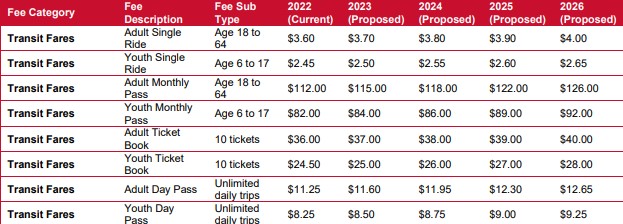
Screenshot of Public Transit fees from the User 2023 – 2026 Service Plans and Budgets User Fee and Rate Changes documents published on Tuesday, Nov. 8, 2022. (Courtesy of The City of Calgary)
Prices will go up all around for recreational fees around the city by 6.3 per cent annually, which includes seniors admissions and passes.
They add seniors will still see a 31 per cent discount when compared to the adult rate at Calgary aquatic and fitness facilities, which they say “represents a gradual reduction” of the current discount, which is 40 per cent off adult rates.
Cemetery rates are expected to go up as well, though the city hasn’t outlined anything for the years following 2023.
“The difference in between what we’re actually looking at here in Calgary is that little bit of money per month is a drastic, drastic shift in the quality of services that you can provide to people,” said Ward 8 Coun. Courtney Walcott.
Budget’s key anticipated operating investments
A projected $41 million will be used to improve transit services, for initiatives like On Demand and eScooters, and for traffic safety.
The city is using $69 million to improve public safety, and $11 million will be used to service the parks and open spaces system.
Funds of $9 million will be used to support economic development and tourism, and says it will be centered around “producing cultural attractions and for services for entrepreneurs and innovators.”
Nineteen million dollars along with a one-time $159 million will be used to preserve heritage assets, for planning policies, and for programs meant to revitalize downtown.
There will be a one-time investment of $44 million, along with an ongoing $3.8 million investment, that will be used for work intended to hit the city’s 2050 climate targets.
The city’s key anticipated capital investments
For capital investments, which pay for assets that benefit people in the city, over $10 billion is being allocated in various areas.
The city is spending $559 million on public transit to improve comfort and reliability, reducing maintenance, and for fuel costs.
When it comes to public safety, $76 million will be spent for an “effective and reliable” emergency response, and for critical infrastructure upgrades in 9-1-1.
To support active living and recreation, the city is allocating $47 million. It also includes improving accessibility and inclusivity.
To help with affordable housing, $154 million will be used to keep families housed, and to help with fostering safe and accessible inclusive housing.
The city is using $170 million for downtown and main streets, which will be used to improve the public realm, attracting investment, and to improve quality of life.
Lastly, $42 million will be used to reduce greenhouse gas emissions, mitigate climate risks, and to prepare for the low-carbon energy transition.
The city says they will continue to invest in infrastructure such as the projected Green Line, the BMO Centre Expansion, and the Arts Commons transformation. They also include an Event Centre and Field house will be worked on.
Council will debate and make final decisions on the budget beginning Nov. 21.
In the meantime, Calgarians can provide their input by writing to their councillors or by registering to speak to members later this month.
More information is on the City of Calgary website.
-With files from Tiffany Goodwein and Pete Curtis
